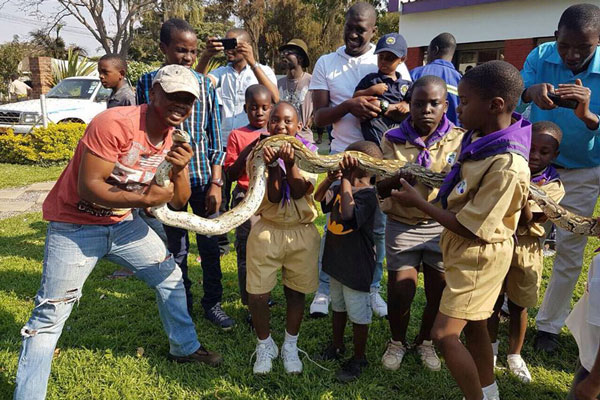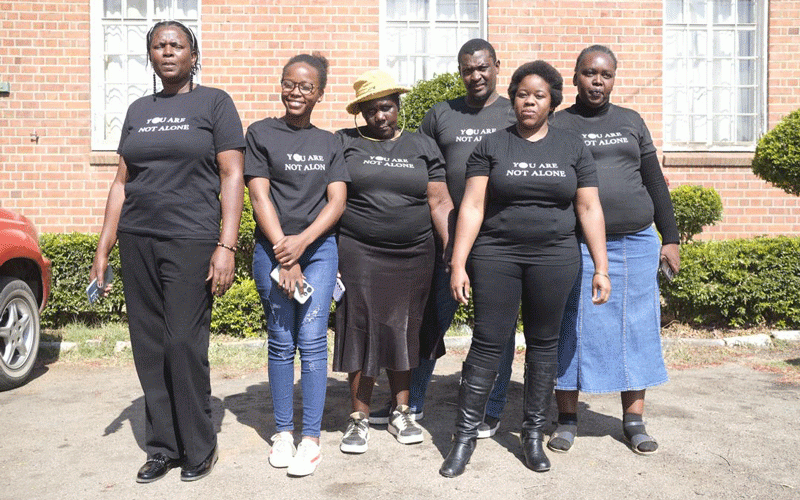
Snakes and Africans have never really mixed, particularly in Zimbabwe. The only people that have been known to be on “friendly” terms with snakes are those believed to be prone to witchcraft tendencies. The atmosphere when a “normal” person and a snake accidentally meet is expected to be one characterised by fear and hostility. As such, people try by all means to avoid creating room in their homes for snakes, or going to places where the venomous elongate creatures are likely to be found — but then at some point or the other the reptiles have found themselves in the wrong places, and that has almost always spelt doom for them.
environment By Chipo Masara

In Zimbabwe, when a snake makes the grave mistake of entering anyone’s home and is spotted, it almost certainly would have brought death upon itself. Armed with all manner of weapons, mostly huge stones (depending on the size of the snake), neighbours will come together in unison, throwing everything at it until they squash it to death. When they are certain of its death, the “bravest” ones among them will then triumphatically carry its carcass to some distant place and burn it.
This is regarded the Zimbabwean formula of handling snakes. As such, very few people tend to even consider calling the Zimbabwe Parks and Wildlife Authority or other professional snake handlers to come and professionally handle the snakes that would have invaded their homes.
And then in enters Chawatama Marimo, Zimbabwe’s very own snake whisperer who has been catching and relocating snakes — mostly pythons — since 1992. The nature-loving man’s Facebook page named Chawa’s Wild Adventures has been causing quite a stir on social media, where he posts National Geographic deserving videos of his adventures — including those of him rescuing some of the most dangerous snakes which would have been found mostly in homes and then going to release them in nice bushy areas where they would likely find peace. In fact, Marimo is fast-becoming the go-to guy when anyone has a snake problem they need handled professionally, in the process breaking the negative stereotypes about black people being non-risk taking.
But contrary to what many of his followers think, Marimo didn’t just wake up one day and decided he wanted to catch snakes. It is an art he has been developing from as way back as the early 90s when he took up a career in mining that ensured he spent long hours in the bush. It was during that time that encounters with wildlife and nature became a major part of his life.
“I had many encounters with snakes and in many of them it would be man versus snakes. People would kill them on sight. I then slowly began to teach myself how to catch and release them and pythons were my first true experience,” said Marimo.
But isn’t he afraid of the venomous reptiles, like most people are?
- Chamisa under fire over US$120K donation
- Mavhunga puts DeMbare into Chibuku quarterfinals
- Pension funds bet on Cabora Bassa oilfields
- Councils defy govt fire tender directive
Keep Reading
“As I recall, I cannot truly remember if I ever had a fear of snakes, but I can truly say I was always fascinated by them. That moment when I would catch a fleeting glimpse of a snake disappearing into the grass, I would always want to know what type it was and would go about looking through books to try and learn more,” he said.
But as is to be expected in a country like Zimbabwe, many did not take too kindly to Marimo’s snake-loving ways and it was not long before very creative stories were cooked up about him. But he didn’t let it hinder him.
“I certainly know that in my culture, a person like me is viewed with much suspicion, but over the years, I have learned not to be affected by what people think of me. I am happy that through my videos and visits to schools, I have changed the minds of a number of people. Snakes and all of God’s creations were made to balance out the House of Nature…meaning that snakes play a massive role in controlling rats and mice which harbour diseases that are deadly to human beings. Anyone that knows history will tell you about the lethal disease called the Bubonic plague that killed millions of people in Europe. That is what happens when important balancers of nature are taken out of an equation,” said Marimo.
Marimo blames bush fires, the cultivation in places snakes would normally live and the huge supply of food (chickens, frogs, birds, etc) in cities for the big numbers of snakes now being found in human habitats. As a result, he has been getting more and more calls to go catch snakes on people’s properties — with cobras being the most common.
“Whenever I get a call, there is a very high chance that it’s a cobra. When that happens there’s good news and there’s bad news: The good news is it’s very rare for a snake to go out of its way to bite a human being, so don’t believe those stories you hear of snakes chasing humans. The only time snakes bite is when they are confronted by people wanting to kill them or when someone accidentally steps on or lies on them.
“The bad news is accidents do happen and Zimbabwe is not a good place to get bitten in as we do not have a good supply of antivenom. Places like Trauma Centre are your best bet, otherwise don’t waste time heading to other places in cases of a bad bite.”
While snake-catching is what he does now, Marimo has a goal of teaching what he learns. He wishes to teach “conservation from a black man’s point of view”, in a way that local people can relate to. In pursuance of that goal, he is appealing to anyone with land or resources to help him set up a “Nature Adventure Park” where schoolchildren can go and learn all about nature and conservation.
But snake-catching is definitely not Marimo’s only wild adventure. When he is not busy rescuing cobras, you will find him with a fishing rod, spearfishing or racing cars.
For feedback, email: [email protected]











